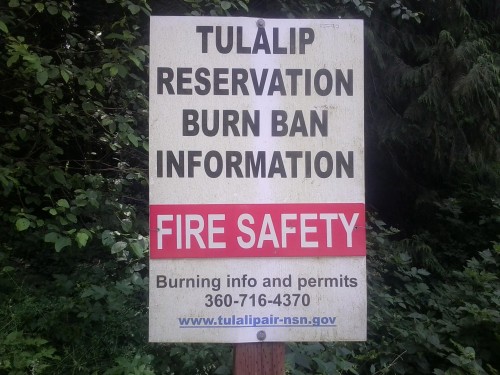
Lighting of fireworks are banned on all Tulalip reservation lands due to increased fire danger.
syəcəb

Lighting of fireworks are banned on all Tulalip reservation lands due to increased fire danger.
Source: Courier Herald
With dangerously hot and dry weather driving fire danger to a new high, the Washington State Department of Natural Resources (DNR) is expanding the current statewide burn ban to cover all outdoor burning on all DNR-protected lands, with no exceptions, the agency announced today.
“All indicators are that we’ll continue to have high heat, low humidity, and storm systems with winds and lightning. That means huge potential for wildfires,” said Commissioner of Public Lands Peter Goldmark. “We need to do everything we can to minimize danger to people, homes and habitat.”
Hot and dry conditions since early summer have caused very high fire hazard conditions throughout the state. These conditions have caused fires to spread rapidly and challenged firefighting efforts. More than $91 million has been spent so far battling wildfires in 2014, and more than 350,000 acres have burned across the state. There are many weeks to go in this year’s fire season, which usually runs into October.
All outdoor burning on DNR-protected lands is prohibited under this ban, including recreational fires in campgrounds or anywhere on DNR-protected lands. Fireworks and incendiary devices, such as exploding targets, sky lanterns, or tracer ammunition, are illegal on all DNR-protected lands. Charcoal briquettes are also not allowed.
In addition, DNR urges extreme caution around any activity that may cause a fire to start. Under these severe fire-hazard conditions, logging operations, land clearing, road and utility right-of-way maintenance, use of spark-emitting equipment, and other activities that create a high risk of fire ignition should be drastically curtailed.
Those who negligently allow fire to spread or who knowingly place forestlands in danger of destruction or damage are subject to possible civil liabilities and criminal penalties under state law. DNR, as well as anyone harmed by such a fire, may pursue damages that include loss of property and fire suppression costs.
The statewide burn ban will run through September 30, 2014. It applies to all lands under DNR fire protection, which does not include federally owned lands.
Snohomish County is one of three counties in which the Puget Sound Clean Air Agency has lowered the air quality burn ban to Stage 1 until further notice.
“Air pollution levels throughout the region have dropped, likely due to clouds and warmer temperatures,” said Dr. Phil Swartzendruber, forecaster for the Puget Sound Clean Air Agency. “The drop in pollution could also be due to the help of our communities following the burn ban. Calm, cold and clear weather conditions are likely to continue over the next few days, so ongoing cooperation with the burn ban will help keep our air healthy.”
The Puget Sound Clean Air Agency will continue to closely monitor the air quality and weather situation.
During a Stage 1 burn ban:
• No burning is allowed in fireplaces or uncertified wood stoves. Residents should rely instead on their homes’ other, cleaner sources of heat, such as their furnaces or electric baseboard heaters, for a few days until air quality improves, the public health risk diminishes and the ban is cancelled.
• No outdoor fires are allowed. This includes recreational fires such as bonfires, campfires, and the use of fire pits and chimineas.
• Burn ban violations are subject to a $1,000 penalty.
• It is okay to use natural gas, propane, pellet and EPA-certified wood stoves or inserts during a Stage 1 burn ban.
The Washington State Department of Health recommends that people who are sensitive to air pollution limit their time spent outdoors, especially when exercising. Air pollution can trigger asthma attacks, cause difficulty breathing, and make lung and heart problems worse. Air pollution is especially harmful to people with lung and heart problems, people with diabetes, children and adults older than 65 years.
The Tulalip and Stillaguamish tribes are likewise among the six Native American reservations on which the U.S. Environmental Protection Agency Region 10 will continue a burn ban on all outdoor burning until further notice, due to stagnant air conditions that are forecast to prevail over the next few days.
This burn ban applies to all outdoor and agricultural burning, including camping and recreational fires within reservation boundaries. Ceremonial and traditional fires are exempt from the outdoor burn ban.
The EPA also requests that reservation residents reduce all sources of air pollution, including excess driving and idling of vehicles, and the use of wood stoves and fireplaces, unless it is their only source of heat.
Air pollution can have significant health impacts. Cooperation from the community will help people who are at risk during this period. Those most at risk are children, the elderly, pregnant women, and those with difficulty breathing, and with heart and lung problems. Those at risk should avoid outdoor exercise and minimize their exposure to outdoor pollution as much as possible.
Please call 1-800-424-4EPA and ask for the Federal Air Rules for Reservations Hotline, or visit the FARR website for the current burn status at www.epa.gov/region10/farr/burnbans.html.